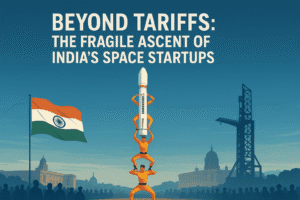Beyond Tariffs: The Fragile Ascent of India’s Space Startups
India’s promising private space sector, exemplified by startup Skyroot Aerospace celebrating a critical rocket test, faces sudden jeopardy from deteriorating US-India relations. Former President Trump’s threatened 50% tariffs on Indian imports clash starkly with recent historic US-India space cooperation, including joint satellite missions and an Indian astronaut flying on SpaceX. While Skyroot publicly downplays the impact, experts warn the sector’s heavy reliance on US financing and critical imported components like specialized electronics makes it highly vulnerable.
Escalating tensions could cripple innovation, inflate costs, and widen the competitive gap with advancing Chinese rivals. Beyond Skyroot, the entire ecosystem stands at risk just as it approaches orbital capability, forcing a fragile balance between technical ambition and geopolitical instability. India’s space aspirations now hinge on whether shared strategic interests in space can overcome damaging trade disputes on Earth. The path to orbit, already fraught with technical challenges, has become dangerously entangled with unpredictable politics.

Beyond Tariffs: The Fragile Ascent of India’s Space Startups
The triumphant image of acrobats carrying a Chandrayaan-3 model through New Delhi’s Republic Day parade captures India’s soaring space ambitions. Yet, a sudden geopolitical storm threatens to ground the nation’s promising private space sector before it truly reaches orbit. The catalyst? Escalating trade tensions with the US, marked by former President Donald Trump’s threats of 50% tariffs on Indian imports and inflammatory rhetoric.
Skyroot’s Precarious Moment:
For Hyderabad-based Skyroot Aerospace, the timing is painfully ironic. Just as CEO Pawan Chandana celebrated a critical milestone – the successful static-fire test for their orbital Vikram rocket – the US-India relationship deteriorated sharply. Skyroot, the first Indian startup to reach space (albeit sub-orbitally in 2022), embodies India’s bid to become a low-cost launch leader. Its strategy heavily relies on US partnerships, like that with Texas-based Axiom Space, nurtured during warmer bilateral ties under both Biden and Trump.
The Contradiction of Cooperation vs. Conflict:
This downturn clashes starkly with recent achievements:
- A joint $1.2 billion NASA-ISRO satellite launch.
- The first Indian astronaut flying aboard a SpaceX rocket to the ISS. Skyroot publicly maintains optimism, stating tariffs won’t impact its core business of serving global satellite operators. However, the subtext reveals deeper anxiety: “India and the US are allied democratic nations… collaborations in strategic sectors [like space] is expected to continue… regardless of differences in other trade aspects.”
The Hidden Vulnerabilities:
Experts see significant risk beneath the brave facade:
- Financing Exposure: “India’s space startup sector is highly exposed to US financing,” warns Chaitanya Giri of the Observer Research Foundation. Sanctions or aggressive tariffs could sever vital funding lifelines.
- Critical Imports: While India excels in rocket propulsion, it remains reliant on imported electronics and specialized alloys. Sudheer Kumar N, former ISRO director, confirms tariffs could disrupt supply chains and inflate costs for startups like Skyroot.
- The China Gap: Delays in Skyroot’s orbital launch (originally slated for 2023, now hoped for late 2025) contrast sharply with multiple Chinese startups reaching orbit. Tariffs could widen this competitive gap, hindering India’s geopolitical aspirations in space.
Beyond Skyroot: A Sector at an Inflection Point:
The threat extends beyond one company. India’s private space ecosystem, fueled by talent and cost advantages, stands at a crucial juncture. Tariffs risk:
- Stifling Innovation: Increased costs divert funds from R&D.
- Isolating Talent: Giri warns the US would lose access to “enormous Indian talent and engineering prowess.”
- Forcing Strategic Shifts: Modi’s recent “detailed conversation” with Putin, reaffirming deep ties, hints at potential realignment if US relations worsen.
The Human Cost of Geopolitics:
Chandana’s pragmatic acknowledgment – “We are always prepared for multiple failures because we believe that we’ll have learning in every mission” – highlights the immense technical challenges startups already face. Adding volatile geopolitics and trade barriers creates an unpredictable environment where technical grit alone may not suffice. The path to orbit, littered with failed first attempts (Space One, Gilmour Space), is hard enough without Earth-bound political turbulence.
The Road Ahead:
India’s space startups represent more than commercial ventures; they are symbols of technological ambition and strategic autonomy. Their success hinges not just on engineering brilliance but on stable international partnerships and open access to global markets and capital. The current US-India friction threatens to undermine years of progress precisely when India’s private space sector is poised for liftoff. Whether shared democratic values and strategic interests in space can overcome trade disputes on Earth remains the critical, unanswered question hanging over mission control in Hyderabad and beyond. The world watches whether geopolitics will clip the wings of India’s rising space eagles before they truly soar.
You must be logged in to post a comment.